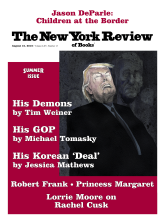In response to:
It Can Happen Here from the June 28, 2018 issue
To the Editors:
Please add me to your list of hundreds, perhaps thousands, of readers flummoxed by this line from Cass Sunstein’s “It Can Happen Here” [NYR, June 28]: “With our system of checks and balances, full-blown authoritarianism is unlikely to happen here.”
I gather that by “full-blown” authoritarianism Sunstein means tyranny that will even harm relatively well-to-do, older white guys like him and me—like friends at church who reassure me that “we’ll survive” the politics of the day.
Indeed, “we’ll survive” has been the mantra of white folks in this nation for centuries. And by and large the white folks have survived.
Sunstein’s satisfaction with “our system of checks and balances” runs counter to the case built by the books he reviews and by most of his own assessment—not to mention the headline for the article, “It Can Happen Here.” What on earth did he mean?
It’s a hypothetical question for me, I guess, because, of course, like Sunstein, I’ll probably survive, but am not sure I would want to.
Herb Strentz
Urbandale, Iowa
To the Editors:
Cass Sunstein’s review of three books about ordinary Germans and the Nazi regime is more disquieting than even he indicates. The normal concern of people of all sorts with their daily lives, family, work, leisure, and so on indicates that only those in certain areas of work and life could possibly notice the slow but relentless advance of authoritarian and totalitarian policies by the government. The Nazis knew how to appeal to people who did not have ideological concerns but only normal human concerns. They knew how to conceal their real goals and how to make passive individuals active supporters.
Our own American people are also not concerned with more than the economy, health care costs, and job opportunities, and they respond positively to those who promise action in these areas, without knowledge enough to judge whether the promises are likely to come to fruition. Very few Americans, like very few Germans, need to be fanatics to support policies that sound attractive but have hidden goals and dangers. Trump seems to know, like Hitler and like Mussolini, and in fact unlike Lenin and Stalin, how to appeal to a variety of concerns with promises that can be both attractive and contradictory. In my view, no population is educated enough, sensitive enough, or ethical enough to see through the deception. Thus the danger is very great indeed. It may in fact be one of the chief weaknesses of democracy that democracy can lead to tyranny just as well or perhaps even more than other political systems.
Norman Ravitch
Emeritus Professor of History
University of California, Riverside
Riverside, California
Cass R. Sunstein replies:
Authoritarianism is made possible by quiescence—by seemingly small decisions by countless ordinary citizens who choose to go about their daily lives rather than to resist. My goal in “It Can Happen Here” was to explore the dynamics of quiescence, with special attention to the rise of Nazism.
I am grateful to Herb Strentz and Norman Ravitch for their vigorous responses. I stand by the proposition that in the United States, full-blown authoritarianism is unlikely to happen. The American Constitution, adopted over two hundred years ago, contains essential safeguards. Horrific things have happened, are happening now, and will happen in the future—but full-scale authoritarianism? If past is prologue, that’s highly improbable.
Ravitch also thinks that I underestimate the current danger. A careful empirical analysis from political scientist Daniel Treisman finds that democratic nations are highly unlikely to become nondemocratic when they are wealthy and have been democratic for a long time.* Using a large amount of historical data, Treisman concludes that the chance that democracy will fail in the United States is exceedingly low. You can accept that conclusion while agreeing that democratic norms and practices are now under serious pressure in the United States, and that violations of democratic ideals (in the form, say, of diminished voting rights) are a matter of grave concern.
This Issue
August 16, 2018
The ‘Witch Hunters’
The American Nightmare
The Queen of Rue
-
*
“Is Democracy in Danger? A Quick Look at the Data,” June 7, 2018, available at www.danieltreisman.org/workinprogress. ↩



